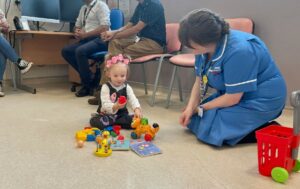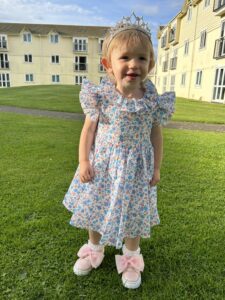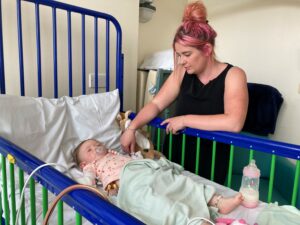ITV Tyne Tees and Granada Reports recently featured the journey of two-year-old Teddi Shaw, who became the first child in the UK to receive NHS life-saving gene therapy treatment, Libmeldy® for the fatal disorder metachromatic leukodystrophy (MLD) at Manchester University NHS Foundation Trust (MFT).
MLD is a genetic disease that causes progressive damage to the affected child’s nervous system, resulting in a severely shortened life expectancy. The revolutionary treatment works by removing the child’s stem cells and replacing the faulty gene that causes MLD before re-injecting the treated cells into the patient.
Teddi began her treatment in June 2022 when she was just 12 months old and was discharged back to her home in Northumberland four months later. Just over one year on from the procedure Teddi returned to MFT for a follow up appointment with specialists at Royal Manchester Children’s Hospital (RMCH) and the Manchester Centre for Genomic Medicine at Saint Mary’s Hospital to monitor the progress of the treatment.
 The consultation involved a neurological examination with Dr Dipak Ram, Consultant Paediatric Neurologist at RMCH, and Dr Arunabha Ghosh, Consultant in Paediatric Inherited Metabolic Disease at Saint Mary’s Hospital to observe Teddi’s condition and abilities, ensuring she is developing in line with a typical toddler.
The consultation involved a neurological examination with Dr Dipak Ram, Consultant Paediatric Neurologist at RMCH, and Dr Arunabha Ghosh, Consultant in Paediatric Inherited Metabolic Disease at Saint Mary’s Hospital to observe Teddi’s condition and abilities, ensuring she is developing in line with a typical toddler.
During the appointment, a selection of toys was laid out for Teddi to interact with, and her reaction was monitored to observe her developmental progress and motor abilities (muscle movement skills, including walking and handling items).
Dr Dipak Ram said: “It has been a pleasure to welcome Teddi and her family back to the hospital and I am extremely reassured by Teddi’s progress since her treatment last year. This is Teddi’s second assessment this year, which are of paramount importance as these two years are when Teddi would start to show signs of MLD, therefore assessing her development and overall health levels is crucial.
“As soon as she entered the consultation room, Teddi almost instantly interacted happily with the toys – a fantastic sign of her progression. Teddi’s speech development and vocabulary are advanced for her age and she’s walking independently, using her hands to pick up objects and turning pages of books very nicely. There are no concerns regarding her vision or hearing. All in all, a completely normal neurological examination and I am reassured that the gene therapy is working well for her so far and she will need ongoing monitoring to ensure this remains the case.”
Teddi’s consultation also involved a blood test, which will monitor her enzyme levels, and she will have an MRI scan to check that her brain continues to develop without features of MLD. Specialists will examine the test results and confirm that Teddi’s treatment continues to work well.
 Speaking to ITV about waiting for the results of Teddi’s crucial post-treatment tests and her experiences at MFT, Teddi’s mum, Ally Shaw said: “We can see that Teddi is doing well and I’m really pleased that her consultants are happy with her motor skills and physical interactions. It’s quite nerve-racking waiting for the results of her further tests because this will confirm if everything is as it should be at the crucial age when signs of MLD would begin to show. Teddi will have regular check-ups and we hope that her progress continues to be positive as this will mean that we can be confident that her treatment has worked.
Speaking to ITV about waiting for the results of Teddi’s crucial post-treatment tests and her experiences at MFT, Teddi’s mum, Ally Shaw said: “We can see that Teddi is doing well and I’m really pleased that her consultants are happy with her motor skills and physical interactions. It’s quite nerve-racking waiting for the results of her further tests because this will confirm if everything is as it should be at the crucial age when signs of MLD would begin to show. Teddi will have regular check-ups and we hope that her progress continues to be positive as this will mean that we can be confident that her treatment has worked.
“I have a really good relationship with all of the doctors, nurses and consultants across the hospitals at MFT. It’s always nice to come back to see everyone, and they can see how Teddi is progressing. I feel really comfortable with everyone, and they have been such a brilliant support throughout her treatment and to us as a family.”
Teddi and her five-year-old sister Nala were both diagnosed with MLD in April last year, but sadly Nala was not eligible for the treatment as the clinical guidance requires the gene treatment to be administered before the irreversible damage caused by the disease progresses too far.
 Despite the heart-breaking circumstances for Nala, Ally remains as positive as possible and wants to continue raising awareness of MLD to prevent other families from experiencing a similar situation. After the promising results from this consultation, hope remains very high for Teddi to continue living her life without the devastating effects of MLD.
Despite the heart-breaking circumstances for Nala, Ally remains as positive as possible and wants to continue raising awareness of MLD to prevent other families from experiencing a similar situation. After the promising results from this consultation, hope remains very high for Teddi to continue living her life without the devastating effects of MLD.
Rebekah Hutton, Metabolic Specialist Nurse at Saint Mary’s Hospital, has been a significant figure within the Shaw family’s journey as she has cared for Teddi from the beginning of her treatment at MFT, as well as providing the family with emotional and wellbeing support.
Regarding her involvement with Teddi’s treatment process, Rebekah said: “Being a part of this pioneering treatment has been so rewarding and to see Teddi’s progress is remarkable.
“I have worked within the team for six years and for MFT to be one of the five centres in Europe offering Libmeldy for children, and to be a pivotal part of Teddi’s journey as the first patient on the NHS to receive the treatment, has been fantastic. It’s been such a journey and for me, it drives my passion and motivation to continue working in this area to improve the lives of children with MLD and pushing forward for newborn screening.”
Teddi has fully recovered from the transplant and is showing no signs of the devastating disease she was born with and will continue to have regular check-ups at MFT.
Libmeldy® is being delivered within RMCH in collaboration with the Manchester Centre for Genomic Medicine at Saint Mary’s Hospital, both part of MFT. The revolutionary gene therapy treatment is available on the NHS as a specialist service, the treatment has a list price of £2.8 million and is the second most expensive drug in the world.